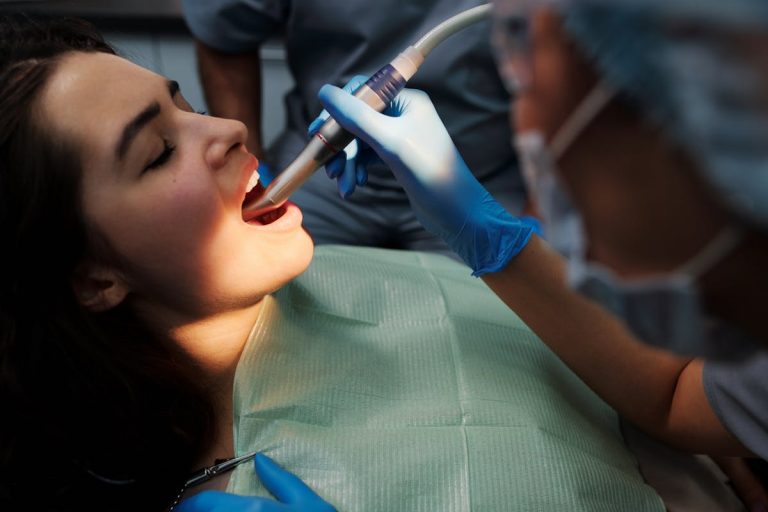- Conducting thorough research on the specific dental procedure beforehand is essential to increase the chances of a successful outcome.
- Before the procedure, collect any required documents, write down the medications and supplements you are currently taking, and inform your dentist of any allergies or sensitivities you may have.
- To ensure a smooth procedure, please refrain from eating or drinking anything after midnight before your appointment.
- Ask questions to understand the timeline, anesthesia used, and potential side effects/risks associated with your visit.
Going to the dentist can be a nerve-wracking experience, but it’s essential to stay informed and prepared for your dental procedure. Knowing what to expect can help put you at ease and ensure your visit goes as smoothly as possible. There are specific steps you should take to prepare for common dental procedures. Taking these steps will ensure that you have everything ready when it comes time for your visit and allow yourself and your dentist to get better results during the procedure.
Research the particular dental procedure you are having.

Proper research is critical in preparing for any medical procedure, including dental procedures. Before undergoing a common dental procedure, educating yourself on what to expect during and after the procedure is essential. This allows you to prepare for the experience mentally and helps ensure a successful outcome.
One example of a common dental procedure is wisdom teeth removal for those with impacted wisdom teeth. Impacted wisdom teeth occur when the tooth fails to emerge from the gum line. This can lead to pain, swelling, infection, and damage to surrounding teeth and bones.
Proper research can help you understand the procedure, what to expect during recovery, and how to care for yourself afterward. It is also important to note that other common dental procedures include fillings, root canals, and extractions. Doing thorough research on any procedure can help alleviate anxieties and increase the chances of a successful outcome.
Prepare for the specific procedure.
Preparing for your procedure is essential to ensure a successful visit. Depending on the type of dental procedure you are having, there may be certain things you need to do in advance. Here are some tips on preparing for common dental procedures:
Get all necessary paperwork and documents ready.
Preparation is vital when it comes to visiting the dentist for common procedures. A critical aspect of preparation that should not be overlooked is getting all necessary paperwork and documents ready beforehand. This includes insurance cards, referral forms, and any medical history forms. Gathering these documents may seem like a hassle, but it is crucial for a smooth and successful dental visit.
These documents will ensure the dentist can access all necessary information and better understand the patient’s health. It also helps to minimize any potential paperwork or administrative delays during the appointment. Patients are encouraged to call ahead and ask what documents are required for their appointment to avoid confusion or last-minute scrambling. Properly preparing for a dental appointment can make for a more efficient and productive visit.
Make sure any current medications or supplements you’re taking are noted.

When preparing for a dental procedure, it is crucial to ensure that all current medications and supplements are noted in the medical history section of the form. This step may seem small, but it is significant to your health. Your medication can impact how your body responds to the procedure, whether it’s local anesthesia or a prescription medication you’re taking for an unrelated medical condition.
Understanding the potential drug interactions that could harm your overall health, is also essential. Dentists can minimize risks and provide the safest possible care with proper documentation of your current medications and supplements. Taking the time to fill out medical history forms accurately can help ensure a smooth and successful dental experience.
Speak with your dentist if you have any allergies or sensitivities.
When preparing for a dental procedure, it is crucial to communicate any allergies or sensitivities you may have with your dentist. This information can affect the type of materials and anesthesia used during the procedure, ensuring a safe and comfortable experience for the patient. Many people have allergies or sensitivities to certain medications, metals, or even latex, which can lead to adverse reactions during a dental procedure.
By speaking with your dentist and providing the necessary information, patients can be assured that the materials used during the procedure will not cause harm or discomfort. It is important to remember that a thorough conversation with your dentist beforehand can give both parties the knowledge needed to ensure a successful, safe, and comfortable dental experience.
Avoid eating or drinking anything after midnight on the night before your appointment.
When preparing for common dental procedures, avoiding food and drink after midnight the night prior is crucially important. This procedure is known as fasting, and it requires patients to refrain from consuming anything that could interfere with the success of their dental procedure.
The reason for this is simple: consuming food or drink before a dental procedure can cause nausea or other side effects, which can cause complications during treatment. Patients who adhere to these guidelines will ensure their dental appointment goes smoothly, reducing any added stress or discomfort. If you have an upcoming dental appointment, speak with your dentist about any necessary fasting requirements.
Ask questions.
Asking the right questions is critical to being a prepared dental patient. Before any common dental procedure, it’s essential to understand the timeline, the type of anesthesia used, and the potential side effects and risks. Patients who are knowledgeable before their appointment will feel less anxious and more confident throughout the process.
Whether it’s a routine cleaning or a more significant dental procedure, being informed ahead of time will allow you to ask more in-depth and informed questions and understand the risks associated with the procedure. Properly preparing for a dental appointment is the responsibility of both the dentist and the patient, and asking the right questions is a crucial component of this process.
These are just a few steps to take when preparing for common dental procedures. To have a smooth visit, gather information and prepare thoroughly beforehand.






